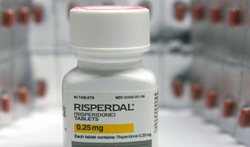
Will $2.2 Billion Risperdal Settlement Change Anything? (not likely…)
Reporting on Health – November 7, 2013 By Martha Rosenberg On the surface, Johnson & Johnson’s $2.2 billion settlement this week for illegally marketing drugs…


Reporting on Health – November 7, 2013 By Martha Rosenberg On the surface, Johnson & Johnson’s $2.2 billion settlement this week for illegally marketing drugs…
GlaxoSmithKline, maker of the selective serotonin reuptake inhibitor Paxil, is mired in a class action lawsuit in Canada that alleges the antidepressant caused birth defects in children whose expectant mothers took the drug without the corporation’s adequate warning of the heightened risks. A British Columbia judge permitted the class action.
Johnson & Johnson, the company that makes the antipsychotic drug Risperdal, has tentatively agreed to a settlement of $2.2 billion to resolve a federal investigation into the company’s marketing practices.
(NaturalNews) Radio personality Dr. Drew Pinsky once touted GlaxoSmithKline PLC’s antidepressant Wellbutrin as one of a few such medications he prescribed to patients suffering from depression because it “may enhance or at least not suppress sexual arousal” as much as other antidepressants.
What he didn’t tell listeners during that 1999 endorsement; however, was that two months earlier Dr. Pinsky – who rose to fame as “Dr. Drew,” co-hosting a popular radio sex-advice show, “Loveline” – received the second of two payments from GSK for a total of $275,000 for “services for Wellbutrin,” The Wall Street Journal reported.
The paper said the payments were made to Pinsky via a communications firm that worked for GSK, according to revelations in an attachment to a complaint filed by the U.S. government in October 2011 in a Massachusetts federal court. The documents were disclosed in early July after the Justice Department announced a $3 billion criminal and civil settlement with GSK over illegal medication marketing, among other things.
The international pharmaceutical giant took top-prescribing psychiatrists to pricey resorts in Bermuda, Jamaica, Hawaii and other exotic locales where, in between spa services, they could hear speeches from fellow shrinks that the company paid to dither on about how kids should pop its pills.
America’s children were depressed. They needed antidepressants. It was GlaxoSmithKline to the rescue.
Paxil was never approved for use by anyone under 18, but GlaxoSmithKline had 1,900 sales reps visiting doctor’s offices, and pushing the drug for kids.